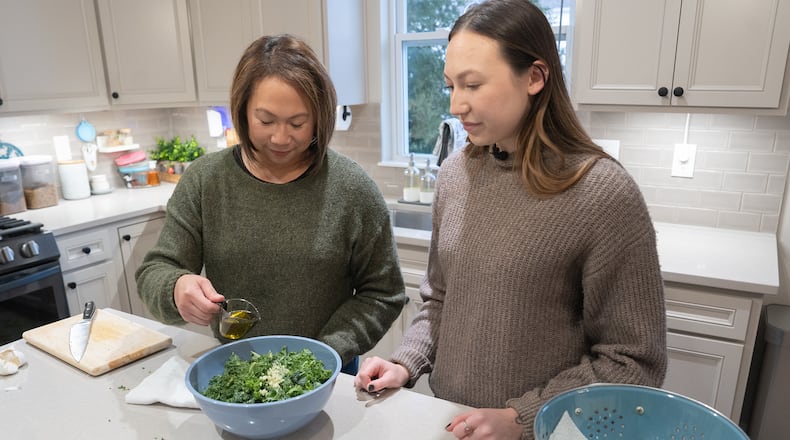Henry’s symptoms led to sleepless nights, mood swings and low energy.
She’s not alone. A new survey from the Ohio State Wexner Medical Center shows 61% of women believe they will hit menopause in their 40s, when, in fact, some will start as early as their 30s or as late as their early 50s.
Hot flashes, mood swings, weight gain and insomnia are all signs of hormonal changes and symptoms of menopause, when a woman no longer has menstrual cycles, doctors say. They can also signal perimenopause, which is a transitional period leading to menopause.
“Perimenopause is when the menstrual cycle has started to change, and it is persistent,” said Dr. Lauren Baker, an obstetrics and gynecology physician at the Ohio State University Wexner Medical Center and certified practitioner with the Menopause Society.
“The formal definition is periods fluctuate by at least seven days for at least 10 months.”
Henry’s situation was triggered by persistent issues with ovarian cysts, which eventually led to her having both of her ovaries removed, along with her uterus, while in her mid-to-late 40s.
She had been wary of going on hormone therapy following her hysterectomy to manage menopause symptoms. Her mother had survived breast cancer three times, and hormones were thought to be cause of one those occurrences.
About two weeks after her surgery, Henry went into full menopause, she said.
“I had heard about symptoms from other women, women who were a little bit older than me ... all those folks were like, ‘Oh, it’s awful,’” Henry said.
She didn’t realize how difficult menopause symptoms would be until she experienced them for herself.
“It was so hard because at night I would wake up, and I would be just sweating,” Henry said.
She would find ways to cool off, but then she would almost immediately start to feel cold. She would feel freezing while still in a pool of sweat, Henry said.
“(It was) just really, really uncomfortable and really hard to feel well rested when I woke up,” Henry said.
Henry also experienced symptoms like hair loss, which she said felt terrifying when she saw her hair falling out.
The Ohio State survey showed half of the women (52%) believe diet and exercise can help treat menopause symptoms, and experts agree.
“Having a diet that’s rich in calcium and vitamin D is really important for bone health,” said Baker. “Fiber and protein are also helpful from a weight management perspective. And then making sure you’re getting whole foods, lots of fruits and veggies also is really important.”
The survey also revealed one in three women are concerned about the long-term health effects of menopause. Other concerns related to reproductive aging among those surveyed include physical symptoms (25%) and mental health (18%).
Younger women were more likely to say mental health is their top concern related to menopause than older women―about 25% of 18-29-year-olds compared 10% among those ages 65 and older.
“Problems in the workplace, adverse effects on one’s quality of life and adverse health events all have been associated with menopause, too,” said Baker. “There are effective treatments and ways to feel better to not only survive but thrive.”
Henry, after about three to four weeks of dealing with menopause, decided to go on an estrogen patch to help manage her symptoms.
It’s important for women, especially mothers and daughters, to talk about these health issues, Henry said.
Even if their daughters may not fully understand the issues yet, it sends the message that daughters can talk to their mothers about these health issues when they happen.
“With my daughter, she and I have pretty open lines of communication anyway about everything, but especially from a health standpoint, even though I know there’s a part of her that can’t really relate fully to the things that I’m sharing with her, I’m hopeful that just by talking about things, she’ll ... be more open to asking me questions,” Henry said.
About the Author



